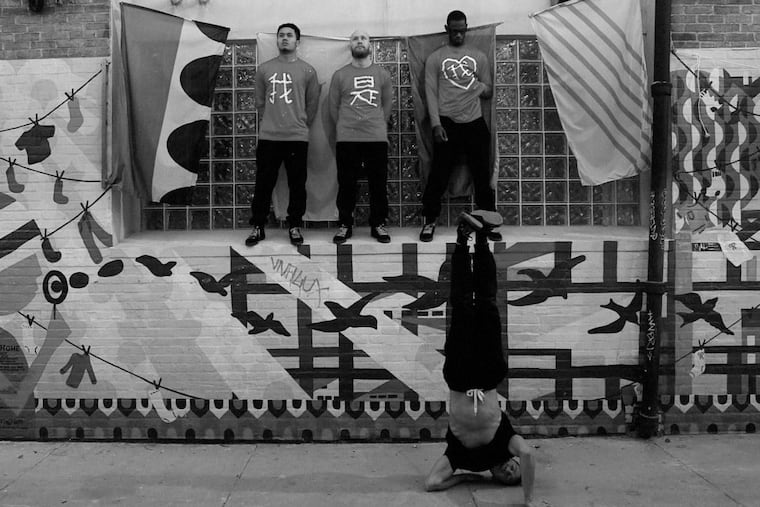Philly breakdancer explores his Asian roots through hip-hop
This year's Asian American Film Festival features a documentary about b-boys looking for themselves in dance.

Growing up in Bermuda, Mark "Metal" Wong had no idea what hip-hop was until MTV came to the island in 2001 when he was 18. When he turned on the television one day, a music video featuring b-boys came on. Wong was mesmerized.
"I had no idea what it was," he said. "I just knew that whatever these guys were doing, like rolling on the ground, I wanted to do that."
In 2001, Wong moved to the Philadelphia area to attend Haverford College. On the weekends, he traveled into the city to explore Philly's underground dance scene. It was then that he began to take dancing more seriously, inspired by all the talent he saw.
"The dance scene here is an underground network of superheroes that no one knows about," he said. "There are people who are working regular minimum-wage jobs, corporate jobs, in college, who will scrounge up space in dance studios and hallways just to practice."
After Wong graduated, he continued b-boying — an acrobatic style of street dance that combines footwork and tumbling — traveling extensively for battles before cofounding Hip Hop Fundamentals, an education company that blends hip-hop with youth empowerment and academic content, in 2010. When Hip Hop Fundamentals was in residency at the Asian Arts Initiative in 2015, an arts center in the Chinatown North neighborhood, Wong met documentarian Aidan Un. At the time, Wong was working on a piece of choreography called "Street Pearls," a dynamic exploration of identity that combines techniques from Chinese and Japanese theater with breaking.
B-boying took off in the 1970s among African American and Latin American youth in the South Bronx. Street corner DJs would often loop dance records, creating rhythmic bass perfect for improvisation. The earliest b-boys and b-girls drew elements from gymnastics, disco, and capoeira, a Brazilian martial art, for their moves. In the 1980s, American soldiers brought b-boying and hip-hop culture to South Korea, where it took off. This style of dance also spread within the Asian American community when Filipino American students introduced it in a culture show at UC Irvine, sparking the creation of many urban dance groups at other universities in the area. B-boying is now a global phenomenon.
Un, who is a hip-hop fan, immediately connected with Wong's artistic vision, and before long, a documentary, The Street Pearls Mixtape, about Wong's performance piece, was in the making. It will be shown Friday, one of four short films on a program at the Philadelphia Asian American Film Festival, accompanied by a freestyle performance by Wong and his crew.
"As a filmmaker, it was amazing to find such a complete world as it lives and breathes in the city of Philadelphia here, with its legends and history and drama," Un said. "It was exciting to find this whole world that has been here all this time."
When Wong's grandmother immigrated to Bermuda, she didn't fit into the existing racial categories — black and white. Despite growing up surrounded by a "sense of Asianness," it wasn't until other people started telling Wong that he was Chinese or Asian that he realized he was different. Gradually, he became interested in Asian "exports," such as anime and kung fu, in his search for identity.
"There are still people who find power and identity through those things, even when they're put through a weird Westernized filter," Wong said. "It's actually a great metaphor for breaking in general as an art form, because breaking takes movements from all different aspects of life."
It was that philosophy that inspired Wong to borrow elements from Chinese and Japanese theater for "Street Pearls." He incorporated masks into the performance to convey the inner turmoil his crew experienced when they were bullied, insecure, or ostracized for being different. He even choreographed a solo piece influenced by butoh, a Japanese dance of "utter darkness." While Wong found his identity through hip-hop, he said he hoped The Street Pearls Mixtape would spark larger conversations about how identity is formed through all kinds of media. He also wanted people to see the positive influence Philly's underground dance scene had on the lives of young people, and the hard work they put into perfecting their moves.
"B-boying is a culture, not a series of fancy movements," Un said. "It's a lens that you can use to look at the world, art form and philosophy. I wanted to try and reinstate a fuller picture of what hip-hop culture looks like in 2017 in Philadelphia. It's alive and breathing in the city."
4 Pillars Shorts + Year of the Ox Live November 17
8:30 p.m., Friday, Asian Arts Initiative, 1219 Vine St.
General admission costs $10.
Information: http://paaff.gala-engine.com/2017/events/4-pillars/